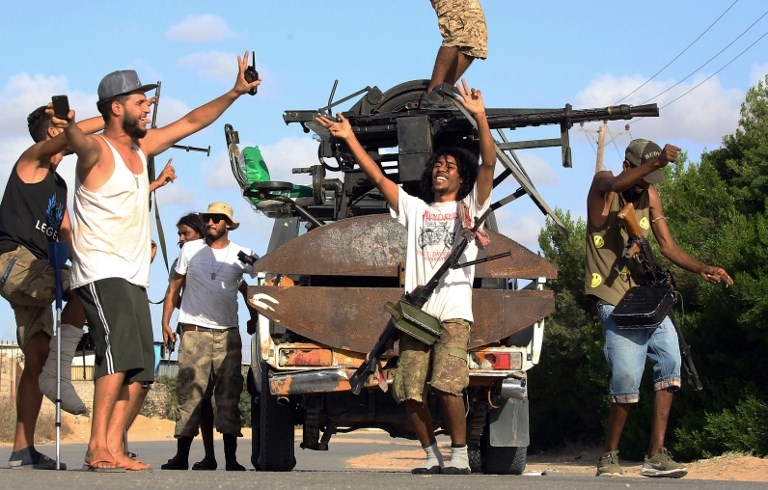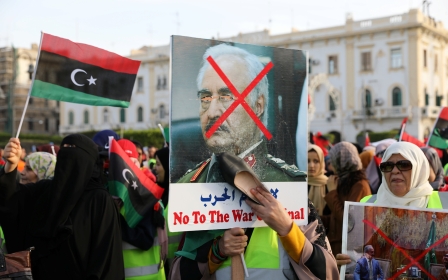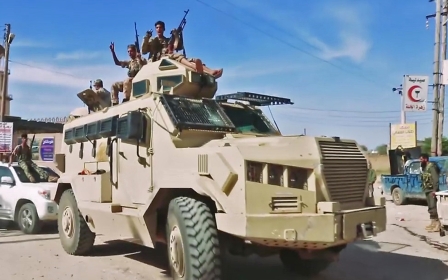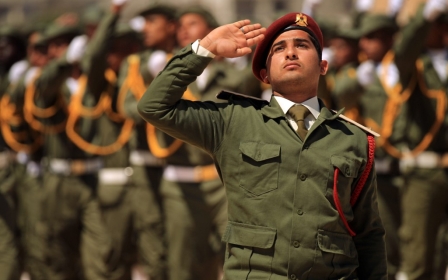Heavy fighting on Tripoli outskirts as GNA forces announce counterattack

The heavy fighting that has been raging on the outskirts of the Libyan capital Tripoli renewed on Saturday as the UN-backed Tripoli-based government announced a counterattack against Khalifa Haftar's forces.
Witnesses in the city centre described hearing heavy shelling from the fighting in southern Tripoli as the death toll from two weeks of fighting between the country's rival governments rose to 220.
The Tripoli-based Government of National Accord's military spokesman, Colonel Mohamad Gnounou, said the GNA's forces was taking up new positions on the capital's outskirts and had carried out seven air strikes against Haftar's self-styled Libyan National Army (LNA).
The violence spiked again after the White House said on Friday that US President Donald Trump spoke by phone earlier in the week with Haftar, who started an offensive against Tripoli on 3 April.
The disclosure of the call and a US statement that it "recognised Field Marshal Haftar's significant role in fighting terrorism and securing Libya's oil resources" has boosted the commander's supporters and enraged his opponents.
New MEE newsletter: Jerusalem Dispatch
Sign up to get the latest insights and analysis on Israel-Palestine, alongside Turkey Unpacked and other MEE newsletters
Western powers and Gulf states have been divided over a push by Haftar's forces to seize Tripoli, undermining calls by the United Nations for a ceasefire.
Despite the offensive, Haftar's LNA has not been able to breach the southern defences of forces allied to the internationally recognised administration based in the city.
On Saturday, shelling was louder and more frequent than in previous days and audible even in central districts more than 10 km away from the frontline, residents said.
"We have launched a new phase of attack. Orders were given early this morning to advance and gain ground," said Mustafa al-Mejii, a spokesman for the GNA forces.
Both sides claimed progress in southern Tripoli, but no more details were immediately available.
"After coordination, our forces have launched vast attack operations," particularly on the Wadi Rabie, Sawani and Ain Zara fronts in the southern suburbs of the capital, said Rida Issa, another spokesman.
On Friday, two children were killed in shelling in southern Tripoli, residents said. The fighting has killed 220 people an wounded 1,066, according to the World Heath Organisation.
Gnounou said strikes took place south of Gharian, 100 kilometres southwest of the capital, and against an air base at al-Wotya, 50 kilometres further southwest.
The LNA, for its part, said its fighters were "taking control of several new positions on the frontlines in Tripoli".
"Our forces are progressing as the GNA militias retreat on all fronts," the LNA said on its Facebook page.
On Friday, Acting US DefenCe Secretary Patrick Shanahan said "a military solution is not what Libya needs." He said he supported Haftar’s "role in counterterroism" and that Washington needed Haftar’s "support in building democratic stability there in the region."
On Thursday, both the United States and Russia said they could not support a UN Security Council resolution calling for a ceasefire in Libya at this time.
Russia objects to the British-drafted resolution blaming Haftar for the latest flare-up in violence when his LNA advanced to the outskirts of Tripoli earlier this month, diplomats said.
The United States did not give a reason for its decision not to support the draft resolution, which would also call on countries with influence over the warring parties to ensure compliance and for unconditional humanitarian aid access in Libya.
Middle East Eye delivers independent and unrivalled coverage and analysis of the Middle East, North Africa and beyond. To learn more about republishing this content and the associated fees, please fill out this form. More about MEE can be found here.




